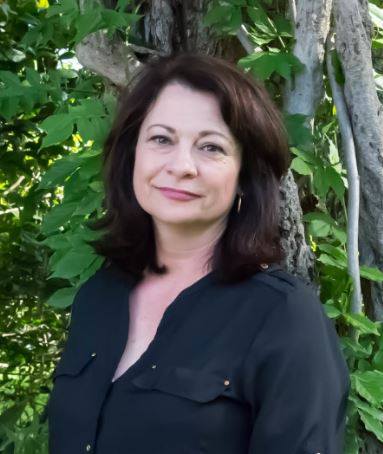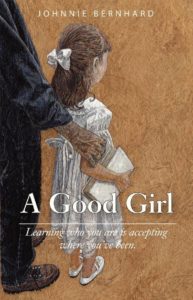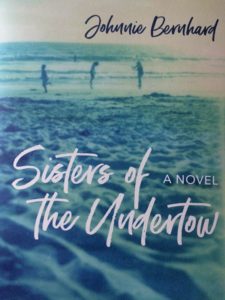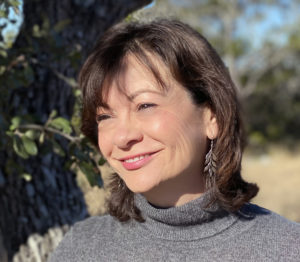
Johnnie Bernhard, photo courtesy of the author
Major Works
- Hannah and Ariela (August, 2022)
- Sisters of the Undertow (February, 2020)
- How We Came to Be (Spring, 2018)
- A Good Girl (Texas Review Press, March, 28, 2017)
Biography of Johnnie Bernhard
Although born in 1962 in Houston, Texas, author Johnnie Bernhard (born Johnnie Alicia Fritz), grew up in Ganado, Texas. She now lives in Ocean Springs, Mississippi, with her husband. They have two children and one granddaughter. Her parents, Mr. and Mrs. Harold Fritz, had six children. Her father was a hard worker who had his own small business, and her mother strongly encouraged her children to read. Her heritage is French and German.
Bernhard earned a BA degree at the University of Houston. She then did graduate work at Nicholls State University. A former AP English teacher and journalist, Johnnie Bernhard’s works have appeared in numerous magazines and newspapers including University of Michigan Graduate Studies Publications, Heart of Ann Arbor Magazine, Houston Style Magazine, World Oil Magazine, The Suburban Reporter of Houston, The Mississippi Press, University of South Florida Area Health Education Magazine, the international Word Among Us, Southern Writers Magazine, Gulf Coast Writers Association Anthologies, The Texas Review, and the Cowbird-NPR production on small town America. Her entry for Cowbird , The Last Mayberry, received over 7,500 views, nationally and internationally.
Bernhard’s first novel, A Good Girl, is an historical fiction work whose main character, a young girl named
Gracey Mueller Reiter, must deal with her father’s alcoholism and her mother’s unfaithfulness as well as her siblings’ issues, but it also covers three centuries of the family in Ireland and America as it follows the immigration path of Gracey’s great-great grandmother Aileen Walsh and her daughter Patricia to Texas. At the end, Gracey, in the present, returns to bury her father and prepare for her daughter’s wedding in Ireland. The work received top ten finalist recognition in the 2015 William Faulkner-William Wisdom Creative Writing Competition and was a featured novel for panel discussion at both the 2017 Mississippi and Louisiana Book Festivals. The novel was also finalist in the 2017 national Kindle Book Award for literary fiction and is also a nominee for the 2018 PEN/Robert W. Bingham Prize. A Good Girl, published by Texas Review Press, has also been nominated for the 2018 Mississippi Institute of Arts and Letters Award for fiction.
Bernhard says she loves history and states “I wanted to tell the immigrant story of the South. I researched documents of the people who settled South Texas. I think it is very important to know what you are writing about. It makes the writing sincere and authentic. I live in coastal Mississippi, so I very much wanted to incorporate the beauty of the Gulf of Mexico into the story. I am also interested in the human condition as a writer. These are the things that affect us all, no matter where we live – family, relationships, personal goals and desires, work, death, marriage.” Interestingly, she says she does not relate herself to any of her characters. She adds, “Some of the characters are sketches of people I have met in my life. The great thing about being a writer is creating a character that may be a blending of three or four people you met or a completely new creation. As a writer, you have the freedom of making that character exactly who you want them to be for effect.”
Bernhard’s second novel, How We Came to Be was published in May 2018 and was a finalist in the 2017 Faulkner-Wisdom Competition. It is set in Houston, Texas, and is the story of Karen Anders, a teacher and a mother. Bernhard’s third novel, Sisters of the Undertow, published by Texas Review Press, is the story of two sisters and the rivalry between them.

Happy young friends group have fun and celebrate while jumping and running on the beach at the sunset
Bernhard’s newest novel is Hannah and Ariela (publishing date August 2022).(See New York Journal of Books comment at right.)
Bernhard is the owner of Bernhard Editorial Services, LLC, where she writes book reviews for Southern Literary Review, and assists writers in perfecting their craft. She and her husband Bryant reside in a nineteenth century cottage in Ocean Springs, Mississippi, surrounded by ancient oak trees and a salt water marsh near the Mississippi Sound.
Interview
by Allen Mendenhall, November 29, 2017, Southern Literary Review (USED BY PERMISSION)
Allen M: You’ve been a regular contributor to Southern Literary Review, Johnnie, so I’m particularly happy for the occasion to interview you about your new novel, A Good Girl. Tell us about Gracey Reiter.
Johnnie B: Gracey Reiter is the protagonist for my work of historical fiction, A Good Girl. A middle-aged woman, Gracey is conflicted by crossroads in her career, marriage, and family relationships. Her conflicts are universal to the human condition – the loss of innocence in youth, the emotional difficulty of aging parents, and life’s meaning as one ages. Woven into this conflict is the story of six generations of an Irish-German immigrant family. The reader will discover these same universal conflicts with each generation, compounded by significant events such as wars, the Great Depression, hurricanes, and other political and economic events.
Gracey reflects upon the lives of her mother, grandmother, and great grandmothers and finds strength and wisdom. The male characters of the novel are complex characters, as well. Gracey interacts with them in the role of wife, mother, daughter, and granddaughter. A Good Girl is the story of family, two countries, and three centuries. It is the story of self-discovery, as well as of the immigrants’ place in American history.
The novel was shortlisted in the Wisdom-Faulkner International Writing Competition, a finalist in the national Kindle Book Award, and a nominee for the 2018 PEN-Bingham Prize. It was chosen for panel discussion at the 2017 Mississippi and Louisiana Book Festivals.
AM: Was it difficult to alternate time periods? Did you have a strategy for keeping the narratives straight?
JB: My strategy for alternating between time periods was based on a common thread woven through all six generations. It is the Bible of Aileen Walsh of Galway, Ireland, the matriarch of the Walsh-Mueller family. The family Bible is passed down to the next generation, ensuring all six generations have taken part in not only viewing the family tree printed on the opening page of the Bible, but also adding to it. The family tree begins with Aileen Walsh of Galway, Ireland in 1830 and ends with Patricia Grace of Forkhill, Ireland in 2015. This family’s immigration story makes a complete circle.
The second connecting thread was a hand embroidered handkerchief with the initials AW owned by the matriarch of the family. This handkerchief is passed down to all the women in the family. It evidently becomes a wedding gift for the American daughter returning to Ireland in 2015.
Perhaps the main organization tool I used was a complete character sketch of each character that included physical attributes, emotional attributes, the era in which they lived, including social and economic issues, and the clothes that he or she may have worn.
My historical research was based on information from the Texas State Historical Association and online articles in the Galway Advertiser of Galway, Ireland.
AM: Have you traveled through Ireland?
JB: I have been to Ireland many times. I adore the people and the culture. Their sense of pride, resilience, and hospitality is second to none.
AM: You used to teach. Did you teach writing?
JB: I taught high school English, including AP English, but I began my writing career as a journalist in Houston many years ago. I believe the dual degrees taught me valuable skills in writing, including the use of sensory details and the economy of words in narration. I most recently taught a writing course at the University of South Mississippi. As an author, I attend many conferences teaching workshops and participating in panel discussions on writing and literature. I enjoy working with writers.
AM: Does A Good Girl attempt to teach anything?
JB: The teaching components would be in the novel’s multiple themes of the immigrant story in America, the importance of family, and the power of self-discovery.
AM: This is your debut novel. How did you write it? I mean right down to the basics—did you use a computer? A pen? A typewriter? Did you have a writing routine?
JB: A Good Girl is my debut novel. My second novel, How We Came to Be, is set for release in May 2018. I am traditionally published by Texas Review Press, a university press in partnership with Texas A&M University Press.
My best energy is in the early morning. This is when I write. I am fortunate to have an office with a lot of natural light. I compose on the computer, but also have note pads in my purse, as well as other places in the house. I never know when I’ll get an idea.
The interesting thing about writing is when you hit the sweet spot, the manuscript takes on a life of its own. There were times I’d wake up in the middle of the night and write. Some days I’d accomplish a paragraph or two, while others I wrote a chapter. The editing process with multiple drafts is just as important as the writing. I had a beta reader and participated in a critique group during the editing process. This is before working with the editor at the publishing house.
AM: For those who don’t know, what’s a beta reader?
JB: A beta reader is an unpaid reader who reads your manuscript, offering suggestions on dialogue, plot, theme, characterization, etc. In return for this service, you read the manuscript of the beta reader. This is not developmental or copy editing, but rather an overall review of the manuscript. It is important to align genres and skills with your beta reader, ensuring a fair exchange of work.
AM: This is probably as good a time as any to mention that you not only write but also help other writers.
JB: I do enjoy helping other writers. I understand the arduous task of writing, editing, publishing, and marketing. It is a very difficult business to break into, as well as sustain. Of course, the more you know about the business, the better off you are. Attend conferences, participate in critique groups, and read the masters of your genre. The most important advice I can give to any writer is to believe in the story you are writing. This passion will sustain you despite the rejections from literary agents and publishers. It’s all part of it.
AM: Have you had any mentors who were writers?
JB: My favorite authors are Barbara Kingsolver, Walker Percy, and William Faulkner. Of course, there are many authors I currently read, beyond the mastery of those three. I learn something from each one. It could be an interesting sentence pattern or the use of sensory detail.
AM: You seem to have a knack for dialogue.
JB: Writing dialogue is about listening carefully to what others say. People do not use complete sentences when they speak. I often read dialogue out loud during the editing process, so I can best judge how “natural” it is.
AM: Well, I appreciate the time you took to dialogue with me
Reviews
Review of A Good Girl
by Jim Fraiser, Sun Herald, March 2017. Used by permission of Johnnie Bernhard.
“Loss, suffering and grace enrich the soul of A Good Girl”
One of the great pleasures of reviewing books is that of discovering rare jewels, especially those written by up-and-coming Mississippi writers.
One of 2017’s best will surely be A Good Girl by Ocean Springs author Johnnie Bernhard, who as much as any writer since Flannery O’Connor and Walker Percy, offers a breathtaking tour of the human heart in conflict with itself, desperately searching for grace and redemption in the face of unremitting loss.
Bernhard’s is a story of a troubled family of Irish descent, whose forebears survived centuries of British-enforced “servitude and ethnic cleansing,” only to endure a diseased “coffin ship” trip to America. But historical suffering only sets the stage for Bernhard’s modern tale seen through the eyes of Biloxi resident, Gracey Mueller Reiter, who feels the guilt of not having supported her deceased mother and father as she should have when they were living and dying.
“My dad died last night,” Bernhard has Reiter say. “All I could think of is how much more I should have loved him,” and stayed with him to the end. “I left my father alone to die … in his shame and loneliness.”
 Reiter knows she served her mother in much the same manner: “I saw her sitting alone and worried,” Reiter confesses. “I knew her pain and walked away from it.”
Reiter knows she served her mother in much the same manner: “I saw her sitting alone and worried,” Reiter confesses. “I knew her pain and walked away from it.”
Sadly, this is a universal story, one that reminds us that we all suffer irredeemable loss and having no way to redeem ourselves with those we failed, we must seek redemption elsewhere.
Lest you think that reading this novel is a form of suffering in itself, or if you’re accustomed to thriller novels and believe this is very far from your thing, remember that few writers share this rising author’s capacity for living, breathing prose that oozes the very substance of humanity from every pore.
Bernhard’s sentences are filled with the stuff of what blues and country music singers refer to as “soul” and “high lonesome.” She begins this novel with the poignant phrase, “I am lost,” and soon notes that Reiter’s father was “the last of a chaotic gene pool, with one leg left and a body oozing with cancer.”
She even uses scene-setting description to further elucidate Reiter’s inner turmoil: “But as the sun climbed higher in the sky, the day with all its expectations and disappointments was rising around her as the traffic increased on the (Biloxi Bay) bridge.”
As with all novels painting our communal suffering on recognizable canvases, there is a silver lining to every well-drawn cloud — if we have the patience to discover it. As Reiter’s priest reminds her, “Confession is not a torture chamber. You should look at it as a second baptism.”
Even Bernhard’s choice of artists for her book’s cover art — oft-awarded Mississippi painter Grady Byrd of Ocean Springs —only serves to prepare the reader for a heart-warming story of redemption that he or she will remember long after Easter, St. Patrick’s Day and Passover have given way to the dog days of summer.
Related Websites
- Review of Sisters of the Undertow by Susan O’Bryan
- Website for author Johnnie Bernhard
- TED Talk about women by Bernhard
- Source for Mendenhall interview above– http://southernlitreview.com/authors/allen-mendenhall-interviews-johnnie-bernhard-author-good-girl.htm
- TRP highlights new book by Johnnie Bernhard.
- Sun-Herald review of A Good Girl by Jim Frasier.
- Texas Hill Country review of Bernhard’s book. Retreat Through Time with This Hill Country Award-Winning Author.



